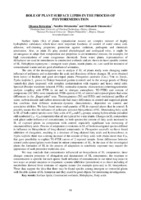ROLE OF PLANT SURFACE LIPIDS IN THE PROCESS OF PHYTOREMEDIATION

Ver/
Fecha
2018Autor
Berzenina, Oksana
Shtemenko, Nataliia
Shtemenko, Oleksandr
Metadatos
Mostrar el registro completo del ítemResumen
Surface lipids (SL) of plants (epicuticular waxes) are complex mixture of highly
hydrophobic substances which have most important functions of control of water status; anti-
adhesive, self-cleaning properties; protection against radiation, pathogens and chemicals
penetration. Also, as plant SL play pivotal physiological and ecological roles, it might be
advantageous to adapt their composition and properties to environmental stresses, for example, for
high concentrations of some exogeneous chemicals. Some water plants, representatives of
Helophytes are used in remediation in constructed wetlands and are shown to have specific content
of SL. Helophytes (synonyms – emergent water plants, marsh plants, etc.) are used for treatment of
contaminated waters and are good absorbers of aromatics.
